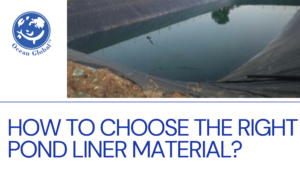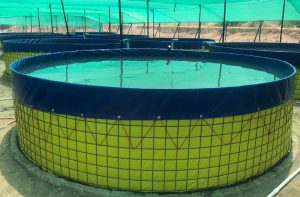Importance of Geotextile in Road Construction

Geotextile are large sheets that conserve our earth’s soil on rainy days & tie strongly. It is principally used for filtration and separation in road constructions. It preserves from the migration of small gravels & sand aggregates.
Geotextile are generally utilized in road construction, particularly to fill gaps between the roads to upgrade soil structure. Geotextile makes low-grade soil more advantageous for use and then simple to build in difficult locations as well. Geotextile are perfect materials used for Construction & infrastructure such as roads, buildings, dams, and many more.
It enhances & substantiality and declines the process of wind & water erosion. It aids to prevent the erosion of soil but lets the water drain off. Geotextile are produced from synthetic or natural fibers banded together with soil thin pieces. It enhances soil characteristics like Friction or movement restraint, Back of loads, and revisions in bearing failure plane.
It is just in recent times that the building market has begun severely taking into consideration geotextile products as critical components for roadway building. Tryouts fabrics started in past times with the Pharaohs utilizing them to take care of inconstant dirt.
The main function of developing the geotextile to be absorptive is to let the circulation of fluids through it. It is applied in structures of properties to avert wind and water decomposition of the dirt and get architectural security.
In the past 25 years, a range of advanced technologies has been developed to solve soil-related issues in construction. These are plotted to be more practical than replacing unsuited soil or avoiding it with deep foundations.
as a matter of course, road construction and maintenance still count heavily on equipment such as motor graders – but new “tech” continues advancing, creating the process of road construction and maintenance easier, quicker, and cheaper.
Geotextile are a vital component of road construction. The absorptive nature of geotextile permits the flow of liquids via them. When used in the infrastructure of structures, geotextile preserve wind and water erosion of the soil and hence bolster structural stability.
Table of Contents
Uses of Woven Geotextile
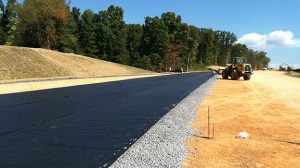
These geotextile fabrics are designed utilizing parallel strands interlinked with each other such as burlap. Differing weave patterns influence the properties of the fabric like porosity and strength. In generic, woven geotextile do not let water flow as freely as non-woven geotextile. This helps in infiltration, after all the fabric, does not permit soil particles to move around freely. As an outcome, roads built with woven geotextile materials consume less and are perdurable.
Uses of Non-Woven Geotextile in Road Construction
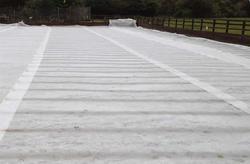
Non-woven geotextile can be prepared to utilize a variety of procedures and look similar to felt fabrics. The non-woven material has a higher likelihood of stretching in contrast to its woven counterpart. This lets water flow along the plane of the fabric, which is notably important when using geotextile for draining water away from the soil or the road.
Reinforcement Applications on Road Construction

Geotextile materials can be utilized to increase the strength and durability of the underlying soil in a roadway. As an instance, the fabric can be used together with sand to evenly distribute the load. This reduces the procedure of rutting and makes sure that no sudden grooves are formed in the road.
Particle Separation
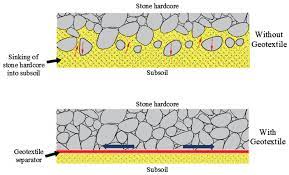
Types of Geotextile
Geotextile are usually made from either polypropylene or polyester. Polypropylene is lightweight, intense, and durable. Polyester geotextile are heavier in contrast, are as intense, and are appropriate for most soil environments.
There are two major geotextile types namely woven and non-woven. Non-woven geotextile are compound three-dimensional structures, built of fibers that are formed into a random network.
They’re specifically beneficial for subsurface drainage and erosion deterioration and building slopes and roads. They’re as well as used extensively in landfills, road and railway construction, land reclamation, and sea defense.
Woven geotextile are established by blending and interlacing fibers. They’re much employed in road construction, where they can be used to divide aggregate layers and maintain the ground under the road and pavement.
Purpose of Geotextile in road construction and maintenance
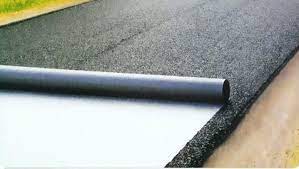
Geotextile for road construction are principally used for mechanical functions. Water can pass via them with minimal erosion of soil particles. By themselves they are used for filtration, bolstering weak soils and improving bearing capacity, and segregating smaller and larger particles to minimize erosion.
A few of the advantages that geotextile have over traditional construction materials are that:
- Dissimilar organic materials, which differ across a site, geotextile are comparably homogeneous
- They’re usually less expensive to buy, transport, and place than soils and aggregates
- They’re easily available and quite less work to install
- They reduce the environmental impact combined with quarrying and transporting materials for use in road construction.
Geotextile Testing
This is useful to inspect the capabilities of textiles that will be useful for Roads & highways. Some testing like Direct shear test, Compressive creep properties, Tensile Creep and Creep Rupture Behavior, Resistance to perforation (Cone drop test), Trapezoid tearing strength, Grab tensile strength, and much more. To assess these behaviors and properties for geotextile, we use the following tools for testing these purposes.
In case you want to do Geotextile Testing, you should experience a person to examine the quality of geotextile via the tensile testing machine, material testing, and friction test as per the implementation place & applications. The most general tests are “puncture resistance testing” and “Tensile Grab Testing”.
Below are some tests available to ensure the strength of the Geotextile.
- Another minor test is as well as important to double-check the quality advance of applying the above tests.
- Tensile grab testing
- Puncture resistance testing or Geotextile Puncture Test
- Geosynthetics Tear Test
- Geotextile Wide Width Strip Test
- Geotextile Seam Strength Test

